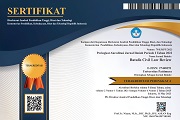Legal Frameworks for Setting Aside Arbitral Awards in Taiwan and Indonesia: A Cross-Country Analysis
 ), Rasmuddin Rasmuddin(2), Ismi Fadjriah Hamzah(3), Matthias Wetzel(4)
), Rasmuddin Rasmuddin(2), Ismi Fadjriah Hamzah(3), Matthias Wetzel(4)
(1) Faculty of Law, Universitas Muhammadiyah Kendari, Kendari, Indonesia

(2) Faculty of Law, Universitas Halu Oleo, Kendari, Indonesia
(3) Faculty of Law, Universitas Muhammadiyah Kendari, Kendari, Indonesia
(4) Faculty of Financial and Economic Laws, Asia University, Taiwan, Province of China
 Corresponding Author
Corresponding Author
Abstract
Introduction: Arbitration awards are one of the effective ways to resolve international business disputes. However, as in other countries, in Taiwan and Indonesia, arbitral awards may be annulled under certain conditions.
Purposes of the Research: This study aims to conduct a cross-country analysis of the legal framework used to annul arbitral awards in Taiwan and Indonesia and evaluate the differences and similarities between the two countries.
Methods of the Research: The research method used is normative legal research with a statutory approach.
Results Main Findings of the Research: The results showed significant differences in the legal framework used to annul arbitral awards in Taiwan and Indonesia. In Taiwan, courts have broad authority to annul arbitral awards, whereas in Indonesia, courts can only annul arbitral awards under certain conditions. However, the two countries have similarities in the mechanism for the annulment of arbitral awards, such as the submission of annulment requests to the courts and the requirements and time limits that must be met to apply for an annulment.Keywords
DOI
10.47268/ballrev.v6i2.2938
Published
2025-07-31
How To Cite
@article{BALLREV2938,
author = {Wahyudi Umar and Rasmuddin Rasmuddin and Ismi Hamzah and Matthias Wetzel},
title = {Legal Frameworks for Setting Aside Arbitral Awards in Taiwan and Indonesia: A Cross-Country Analysis},
journal = {Batulis Civil Law Review},
volume = {6},
number = {2},
year = {2025},
keywords = {Legal Frame Works; Arbitral Award; Annulment.},
abstract = {Introduction: Arbitration awards are one of the effective ways to resolve international business disputes. However, as in other countries, in Taiwan and Indonesia, arbitral awards may be annulled under certain conditions.Purposes of the Research: This study aims to conduct a cross-country analysis of the legal framework used to annul arbitral awards in Taiwan and Indonesia and evaluate the differences and similarities between the two countries.Methods of the Research: The research method used is normative legal research with a statutory approach.Results Main Findings of the Research: The results showed significant differences in the legal framework used to annul arbitral awards in Taiwan and Indonesia. In Taiwan, courts have broad authority to annul arbitral awards, whereas in Indonesia, courts can only annul arbitral awards under certain conditions. However, the two countries have similarities in the mechanism for the annulment of arbitral awards, such as the submission of annulment requests to the courts and the requirements and time limits that must be met to apply for an annulment.},
issn = {2746-8151}, pages = {96--105} doi = {10.47268/ballrev.v6i2.2938},
url = {https://fhukum.unpatti.ac.id/jurnal/ballrev/article/view/2938}
}
Andriansyah, Muhammad. “Pembatalan Putusan Arbitrase Nasional Oleh Pengadilan Negeri.” Jurnal Cita Hukum 2, no. 2 (2014). https://doi.org/10.15408/jch.v1i2.1472.
Ariprabowo, Tri, and R. Nazriyah. “Pembatalan Putusan Arbitrase Oleh Pengadilan Dalam Putusan Mahkamah Konstitusi Nomor 15/PUU-XII/2014.” Jurnal Konstitusi 14, no. 4 (2018): 701. https://doi.org/10.31078/jk1441.
Bambang, Sutiyoso. “Penyelesaian Sengketa Bisnis.” Citra Media Yogyakarta, 2006, 3.
Chadijah, Siti. “Problematika Pembatalan Putusan Arbitrase Oleh Pengadilan (Studi Kasus : Pt Geo Dipa Energi (Persero) Dengan Pt Bumigas Energi).” Rechtsregel : Jurnal Ilmu Hukum 2, no. 1 (2019): 479–94. https://doi.org/10.32493/rjih.v2i1.2982.
Court, Supreme. “Judgment 93-Tai-Shang-Tzu No. 1690.” 2004.
———. “Judgment 99-Tai-Shang-Tzu No. 1788.” 2010.
Fuadi, Munir. “Arbitrase Nasional : Alternatif Penyelesaian Sengketa Bisnis,” 2000, x, 260 pages ; 24 cm.
Gatot P. Soemartono. Arbitrase Dan Mediasi Di Indonesia, 2006. https://books.google.co.id/books?id=mrZ_ekR8go0C.
Harahap, M. Yahya. Arbitrase. Jakarta: Sinar Grafika, 2006.
Harahap, Panusun. “The Implementation of International Arbitration Decisions in Indonesia and Some Foreign Countries.” Yuridika 34, no. 1 (2019): 116. https://doi.org/10.20473/ydk.v34i1.11402.
Kantaatmadja, Mieke Komar. “National Court and the Interactions with Tribunals, the Indonesian Experience.” In Proceeding Sixth RAIF Conference on International Arbitration, 7, 2012.
KBBI. “Arti Kata Aposteriori - Kamus Besar Bahasa Indonesia (KBBI) Online.” kbbi.web.id, 2023. https://kbbi.web.id/aposteriori.
———. “Arti Kata Apriori - Kamus Besar Bahasa Indonesia (KBBI) Online.” kbbi.web.id, 2023. https://kbbi.web.id/apriori.
Kurniati, Grasia. “Studi Perbandingan Penyelesaian Sengketa Bisnis Dan Implementasinya Antara Lembaga Badan Arbitrase Nasional Indonesia Dan Singapore International Arbitration Centre.” Jurnal Ilmiah Hukum De’Jure 1, no. 2 (2016): 201–34.
Lawyers, BP. “Prosedur Mendaftarkan Putusan Arbitrase Di Pengadilan Negeri.” blog.bplawyers.co.id, 2016. https://blog.bplawyers.co.id/prosedur-mendaftarkan-putusan-arbitrase-di-pengadilan-negeri/.
Lin, Angela Y, and Nigel N T Li. “Arbitration in Taiwan , the Republic of China.” International Commercial Arbitration 1, no. 1 (2013): 1–19.
Lo, Chang-Fa. Taiwan - Arbitration Law and Practice in Asia. Second. Taiwan: JURIS Arbitration Law, 2023. https://arbitrationlaw.com/library/taiwan-arbitration-law-and-practice-asia-second-edition.
Lo, Jeffrey, and Winnie Jo-mei Ma. “Arbitration in Taiwan : Recent Developments,” 2018. http://www.aprag.org/wp-content/uploads/2021/05/4-Arbitration-in-Taiwan-Recent-Developments.pdf.
Mahkamah Konstitusi Republik Indonesia. Putusan Mahkamah Konstitusi No. 15/PUU-XII/2014 tentang Pengujian Undang-Undang Nomor 30 Tahun 1999 tentang Arbitrase dan Alternatif Penyelesaian Sengketa (2014).
Marianne Chao. Arbitration in Hong Kong: A Practical Guide. Edited by Denis Brock. 5th Editio. Sweet & Maxwell, 2021. https://www.sweetandmaxwell.com.hk/BookStore/showProduct.asp?countrycode=HK&id=2923&subjID=&ptab=1&bookstore=0&g=e84l&ec=QSNBGDKTJJVZRUJQFVYYUAEDBTVQRLIGGGRYABQHEUINZJSCKSLOVIKV.
Pratidina, Ilhami Ginang. “Interpretasi Mahkamah Agung Terhadap Alasan Pembatalan Putusan Arbitrase Dalam Pasal 70 Uu No. 30/1999.” Yuridika 29, no. 3 (2014): 310–29. https://doi.org/10.20473/ydk.v29i3.374.
Rengganis. “Tinjauan Yuridis Pembatalan Putusan Arbitrase National Berdasarkan Pasal 70 Undang- Undang No. 30 Tahun 1999 (Studi Kasus Terhadap Beberapa Putusan Mahkamah Agung RI).” Universitas Indonesia, 2011.
Sefriani. “Investment Arbitration Bagi Negara Berkembang Dan Terbelakang.” Yustisia Jurnal Hukum 2, no. 2 (2013). https://doi.org/10.20961/yustisia.v2i2.10186.
Simamora, Y Sogar, Sujayadi, and Yuniarti. “Binding Effect of Arbitration Clause to Third Parties: Privity of Contract Doctrine Vs. Piercing The Corporate Veil.” Yuridika 33, no. 1 (2018): 171. https://doi.org/10.20473/ydk.v33i1.7256.
Situmorang, Mosgan. “Pembatalan Putusan Arbitrase.” Jurnal Penelitian Hukum De Jure 20, no. 4 (2020): 573. https://doi.org/10.30641/dejure.2020.v20.573-586.
Sturzaker, D. “Arbitration in Asia.” ADR Bulletin 4, no. 2 (2001): 1–6. http://epublications.bond.edu.au/cgi/viewcontent.cgi?article=1134&context=adr.
Sujayadi, S. “Patologi Dalam Arbitrase Indonesia: Ketentuan Pembatalan Putusan Arbitrase Dalam Pasal 70 Uu No. 30/1999.” ADHAPER: Jurnal Hukum Acara Perdata, 2015. http://jhaper.org/index.php/JHAPER/article/view/19%0Ahttps://jhaper.org/index.php/JHAPER/article/download/19/25.
Sujayadi, Sujayadi. “Interaction Between The Setting Aside Of An Award And Leave For Enforcement.” Yuridika 30, no. 2 (2015): 333–51. https://doi.org/10.20473/ydk.v30i2.4661.
Tao, Jingzhou. “Salient Issues In Arbitration In China.” American University International Law Review 27, no. 4 (2012): 807–30. https://scholar.google.co.uk/scholar?hl=en&q=commercial+arbitration+in+asia&btnG=&as_sdt=1%2C5&as_sdtp=#7.
Vunieta, and Walida Ahsana Haque. “Legal Protection Against the Failure To Compensate on International Investment Dispute.” Yustisia Jurnal Hukum 8, no. 2 (2019): 205. https://doi.org/10.20961/yustisia.v8i2.28490.
Yuan, Judicial. “Judicial Statistic Yearbook, State and Subject-Matter Amounts of Money of Civil Cases Terminated in the First Instance by the District Courts – by Litigation Type (Cont. End).” Taiwan, 2021. https://www.judicial.gov.tw/en/lp-2206-2-xCat-09-1-60.html.| Dublin Core | PKP Metadata Items | Metadata for this Document | |
| 1. | Title | Title of document | Legal Frameworks for Setting Aside Arbitral Awards in Taiwan and Indonesia: A Cross-Country Analysis |
| 2. | Creator | Author's name, affiliation, country |
Wahyudi Umar; Faculty of Law, Universitas Muhammadiyah Kendari, Kendari; Indonesia  |
| 2. | Creator | Author's name, affiliation, country | Rasmuddin Rasmuddin; Faculty of Law, Universitas Halu Oleo, Kendari; Indonesia |
| 2. | Creator | Author's name, affiliation, country | Ismi Fadjriah Hamzah; Faculty of Law, Universitas Muhammadiyah Kendari, Kendari; Indonesia |
| 2. | Creator | Author's name, affiliation, country | Matthias Wetzel; Faculty of Financial and Economic Laws, Asia University; Taiwan, Province of China |
| 3. | Subject | Discipline(s) | |
| 3. | Subject | Keyword(s) | Legal Frame Works; Arbitral Award; Annulment. |
| 4. | Description | Abstract | Introduction: Arbitration awards are one of the effective ways to resolve international business disputes. However, as in other countries, in Taiwan and Indonesia, arbitral awards may be annulled under certain conditions.Purposes of the Research: This study aims to conduct a cross-country analysis of the legal framework used to annul arbitral awards in Taiwan and Indonesia and evaluate the differences and similarities between the two countries.Methods of the Research: The research method used is normative legal research with a statutory approach.Results Main Findings of the Research: The results showed significant differences in the legal framework used to annul arbitral awards in Taiwan and Indonesia. In Taiwan, courts have broad authority to annul arbitral awards, whereas in Indonesia, courts can only annul arbitral awards under certain conditions. However, the two countries have similarities in the mechanism for the annulment of arbitral awards, such as the submission of annulment requests to the courts and the requirements and time limits that must be met to apply for an annulment. |
| 5. | Publisher | Organizing agency, location | Faculty of Law, Universitas Pattimura |
| 6. | Contributor | Sponsor(s) | |
| 7. | Date | (YYYY-MM-DD) | 2025-07-31 |
| 8. | Type | Status & genre | Peer-reviewed Article |
| 8. | Type | Type | |
| 9. | Format | File format | |
| 10. | Identifier | Uniform Resource Identifier | https://fhukum.unpatti.ac.id/jurnal/ballrev/article/view/2938 |
| 10. | Identifier | Digital Object Identifier | 10.47268/ballrev.v6i2.2938 |
| 11. | Source | Title; vol., no. (year) | Batulis Civil Law Review; Vol 6, No 2 (2025): VOLUME 6 ISSUE 2, JULY 2025 |
| 12. | Language | English=en | en |
| 13. | Relation | Supp. Files | |
| 14. | Coverage | Geo-spatial location, chronological period, research sample (gender, age, etc.) | |
| 15. | Rights | Copyright and permissions | Copyright: Authors who publish their manuscripts in this Journal agree to the following conditions: 1. The copyright in each article belongs to the author, as well as the right to patent. 2. Authors are able to enter into separate, additional contractual arrangements for the non-exclusive distribution of the journal's published version of the work (e.g., post it to an institutional repository or publish it in a book), with an acknowledgment of its initial publication in this journal. 3. Authors are permitted and encouraged to post their work online (e.g., in institutional repositories or on their website) prior to and during the submission process, as it can lead to productive exchanges, as well as earlier and greater citation of published work. 4. Authors have the right to self-archiving of the article (Author Self-Archiving Policy)
Licence : Batulis Civil Law Review Journal is disseminated based on the Creative Commons Attribution-NonCommercial 4.0 International license terms. This license allows anyone to copy and redistribute this material in any form or format, compose, modify, and make derivatives of this material for any purpose. You cannot use this material for commercial purposes. You must specify an appropriate name, include a link to the license, and certify that any changes have been made. You can do this in a way that is appropriate, but does not imply that the licensor supports you or your use.
|
Copyright (c) 2025 Wahyudi Umar, Rasmuddin Rasmuddin, Ismi Fadjriah Hamzah, Matthias Wetzel

This work is licensed under a Creative Commons Attribution-NonCommercial 4.0 International License.

 : 588 times
: 588 times Download : 274 times
Download : 274 times














